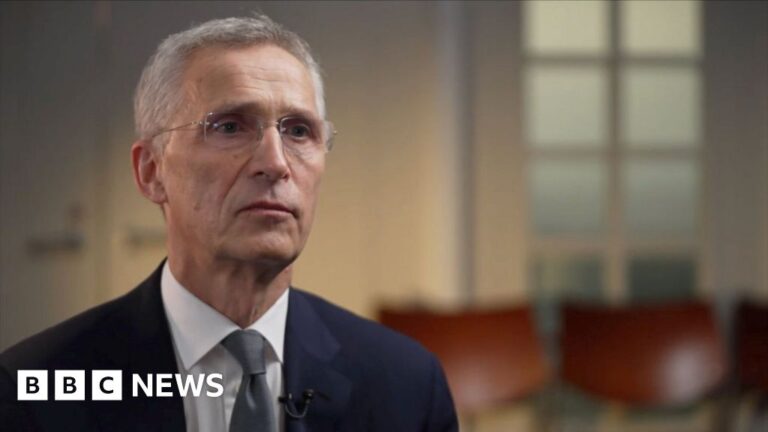NATO’s chief told the BBC that if China does not change its stance it should face consequences for its support of Russia’s war in Ukraine.
Jens Stoltenberg said China was “trying to have both sides’ interest” by supporting Russia’s war effort while also seeking to maintain ties with its European allies.
“It’s not going to work in the long term,” Stoltenberg told BBC News during a visit to Washington.
In a wide-ranging interview, Stoltenberg also discussed nuclear weapons and defense spending.
His remarks come as Russia shows no signs of easing up on its war against Ukraine.
At a peace summit in Switzerland over the weekend, dozens of countries pledged to support Kiev, but Russia called it a waste of time and said it would only agree to peace talks if Ukraine effectively surrendered.
Asked how NATO allies might respond to China’s support for Russia, Stoltenberg said “discussions are ongoing” about possible sanctions.
He said China is “sharing a lot of technology.” [like] “Microelectronics that are key to building the missiles and weapons that Russia will use against Ukraine.”
“At some stage we should consider imposing some economic costs on China if they don’t change their behaviour,” he added.
Beijing has already been sanctioned for its support for Russia, and last month the United States announced restrictions targeting around 20 companies based in China and Hong Kong.
China has defended its deals with Moscow, saying it is not selling lethal weapons and that it “handles the export of dual-use items carefully and in accordance with laws and regulations.”
This follows his visit to China last month.
Russia has become increasingly isolated on the world stage since launching an all-out war with Ukraine in 2022. Putin has repeatedly said the balance of power in the West is shifting and has sought to strengthen ties with like-minded leaders.
“Russia is now aligning itself with increasingly authoritarian leaders,” Stoltenberg told the BBC, naming Iran, Beijing and North Korea.
He said North Korea had sent artillery shells to Russia and in return Russia had provided advanced technology for North Korea’s missile and nuclear programs.
“In other words, North Korea is supporting Russia in waging a war of aggression against Ukraine.”
The NATO secretary-general also announced ahead of his meeting with US President Joe Biden that more than 20 countries are expected to meet the 2% defence spending target this year, higher than in any year since it was pledged in 2014.
“This is a good thing for Europe and a good thing for the United States, especially since much of this additional funding will be spent in the United States,” he said.
Stoltenberg also referred to comments he made to The Telegraph on Sunday in which he suggested NATO might be considering increasing the number of deployable nuclear warheads as a deterrent against growing threats from Russia and China.
The comments were criticised by Kremlin spokesman Dmitry Peskov, who said they would “only further escalate tensions”.
But Stoltenberg said it was a “general message” that NATO was a nuclear alliance and any attack on a NATO member state would “provoke an alliance-wide response.”
“NATO’s purpose is not to fight wars, but to prevent wars,” he said.

